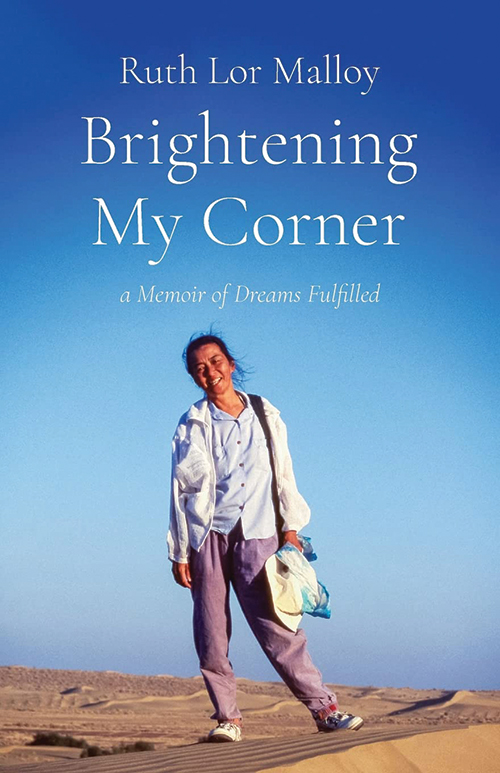
Brightening My Corner: A Memoir of Dreams Fulfilled
Reviewed by Judith Wright Favor
February 1, 2024
By Ruth Lor Malloy. Barclay Press, 2023. 316 pages. $25/paperback.
Quaker practices, divine directives, and innate curiosity guided Ruth Lor Malloy in her lifelong fight against racial discrimination. Now in her 90s, the author started life in a small Canadian town. Her grandmother was a Chinese concubine. Her grandfather, a merchant, brought the girl (not his wife) to rural Canada in the early 1900s. Malloy grew up as a racialized minority.
After graduating from the University of Toronto in 1954 where she studied religion and had been involved with the Student Christian Movement, she traveled to Mexico to participate in a workcamp run by American Friends Service Committee (she first learned about AFSC workcamps as a teenager reading Seventeen magazine). This experience introduced her to Quaker beliefs. She started going to meetings for worship once back in Toronto, and later became a member, calling Quakerism her “spiritual anchor” as she traveled the world.
In 1965, she married a war correspondent and moved to Saigon. Malloy explains how she “wore local pajamas with my hair braided, pretending to be Vietnamese, so the prices would be cheaper.” She also didn’t want to be a Viet Cong target. “My disguise worked until I opened my mouth. I published a story about how foreigners lived in a country at war.”
In 1973, she finally visited her family’s ancestral village in Taishan county and was “feeling 10 percent Chinese then, but that percentage would continue to fluctuate.” In the next 30 or so years, she traveled to China frequently, “learning about its diversity and the development of its tourism infrastructure. I saw again how racial, sexual, and cultural discrimination and political power in unwise hands caused a lot of suffering.” But she also saw ways she could help, and a path emerged: “As opportunities to finance research came up, I began to feel that writing guidebooks was my destiny.” The work was satisfying for Malloy, and she pursued it creatively while balancing family life.
While raising three children in Maryland, Malloy tried to be, in her view, “an ideal American mother.” In 1975, she and her husband, Michael, “adopted” two former Vietnamese paratroopers airlifted to America, hosting them until they were able to live on their own. Another Quaker family did the same. She reflects on the ways this experience enriched their lives: “We enjoyed Khiem and Go. They would jump off the roof of our bungalow for the amusement of the neighborhood children.” During this time when her main identities were mother and wife, they “brought the outside world to us, the world beyond my own culture, whatever that was.”
Driven by a yen for adventure and a desire to be useful, Ruth and Michael worked tirelessly for half a century to increase racial harmony in our troubled world. She wrote articles and guidebooks, and served with Michael on his assignments in Vietnam, Philippines, Hong Kong, Toronto, Kazakhstan, India, Africa, and Myanmar, often seeking out the nearest Quaker meeting.
In their fifty-sixth year of marriage, Michael’s inoperable brain tumor led him to choose a medically assisted death. Malloy and her daughter honored him in an unconventional way: “I didn’t want a funeral. Mike was not one for such rituals, and it wouldn’t have been appropriate. Linda and I decided on a celebration of his life. Throwing axes with friends was more in keeping with his sense of fun.”
The question of racial identity captivated the author. Late in life she still wondered, “Are we Chinese? . . . I have to admit that I feel about 5 percent Chinese now.” This uncertainty was further complicated by the COVID pandemic, which brought renewed racial discrimination against Chinese people in Canada.
True to her Quaker roots, she ends with advices and queries:
Will there still be a useful role for any of us human adventurers to play? Will we be replaced by machines, too? Humans are social beings and need to express and receive loving, human attention. We will always need a human smile, a listening ear, a gift of a cup of coffee, and a cookie. . . . [M]ost of us can only help in our own small corners; and help we must, especially now that the very existence of our species and our home planet is threatened. We must keep our skepticism, our curiosity, our ingenuity, and our sense of adventure alive. And maintain our love for other humans.
The final words of her memoir come from hymn writer Ina Mae Duley Ogdon:
Brighten the corner where you are!
Someone far from harbor you may guide across the bar;
Brighten the corner where you are!
Judith Wright Favor does her best to brighten her corner in Pacific Yearly, Southern California Quarterly, and Claremont Meetings. (Editor’s note: This review is published posthumously. Judith passed away on December 8, 2023, at the age of 83. We’re grateful for her many contributions to Friends Journal over the years.)



Comments on Friendsjournal.org may be used in the Forum of the print magazine and may be edited for length and clarity.